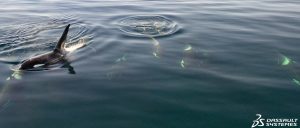Seventy-four Southern Resident Killer Whales call the waters off Canada’s west coast home. Spread across three pods, the orcas follow the salmon run through the Salish Sea. These magnificent animals are at the top of the food chain, but their lives are endangered.
Facing threats from contaminants, declining food supply and noise pollution, the number of whales in the region has dropped significantly over the past decade. Meanwhile, experts say noise from passing ships has increased several decibels per decade for several decades – and it’s becoming a real problem for the whales.
A new video from Dassault Systemes, created as part of “Water for Life, the second act of our Only Progress is Human campaign, examines the impact of noise from large ships on the whales’ echolocation and hunting and the efforts of one local company to make a difference.
Killer whales are dependent on sound. They communicate using cries, whistles, squeals and other noises. Each pod even has their own dialect, like a family may come up with its own special coded language. The whales also use echolocation for hunting and navigation. Combine the dwindling Chinook salmon population with conditions that make finding the fish more difficult and it’s easy to see how rising decibel levels are real threat to population.
“That’s like living constantly in a thick fog,” said Jasper Kanes, staff scientist for passive acoustics and science services for Ocean Networks Canada. “It makes it hard for them to communicate with each other and find food. … It’s really questionable if we’re still going to have these animals in 20 years.”
The Canadian government has put measures in place to protect the Southern Resident Killer Whale population, including a mandate that boats keep further away from killer whales in the coastal waters of British Columbia. Another way to protect this endangered species: finding solutions for making vessels quieter. And one local hydrogen fuel cell manufacturer is doing exactly that.
Corvus Energy is developing a battery system targeted at the cruise and cargo industries, and ferries. The batteries, which are being tested by several large companies, reduce pollution and a lot of the noise from large vessels.
In addition to interest in using batteries on new ships, Corvus can retrofit products to existing ships to create quieter hybrids.
In the video, Jeremy Lindstrom, a senior mechanical engineer at Corvus Energy and local to the area describes the powerful experience getting up close and personal with an orca that breached right beside his friend’s fishing boat.
“I looked right into his eye and that’s just absolutely amazing. That’s something we need to protect,” says Lindstrom. “It really brings me a lot of satisfaction to know that the technology that I’m working on helps in our own backyard.”
Watch the video below to get the whole story. And check out our Water for Life page to learn more about how we can protect our most precious resource.

